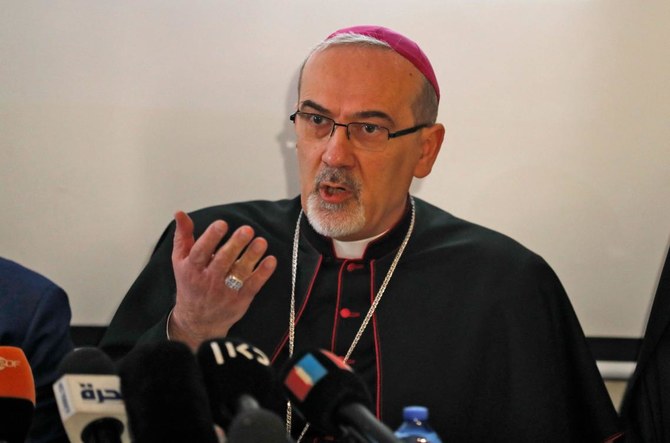JERUSALEM: The top Catholic clergyman in the Holy Land on Monday condemned the police beating of mourners carrying the casket of Al Jazeera journalist Shireen Abu Akleh, accusing the authorities of violating human rights and disrespecting the Catholic Church.
Latin Patriarch Pierbattista Pizzaballa told reporters at St. Joseph Hospital in Jerusalem that Friday’s incident, broadcast around the world, was a “disproportionate use of force” to the Palestinian flag-waving crowd of thousands proceeding from the hospital to a nearby Catholic church in Jerusalem’s Old City. The attack drew worldwide condemnation and added to the shock and outrage of Abu Akleh’s killing as she covered a shootout in the occupied West Bank.
The police attack, Pizzaballa told reporters, “is a severe violation of international norms and regulations, including the fundamental human right of freedom of religion, which must be observed also in a public space.”
There was no immediate Israeli response.
He spoke as Israel and the Palestinians are locked in a war of narratives over the killing of Abu Akleh. The reporter, a Palestinian-American and a 25-year veteran of the satellite channel, was killed Wednesday while covering an Israeli military raid in the Jenin refugee camp. She was a household name across the Arab world, known for documenting the hardship of Palestinian life under Israeli rule.
Palestinian officials and witnesses, including journalists who were with her, say she was killed by army fire. The military, after initially saying Palestinian gunmen might have been responsible, later backtracked and now says it’s not clear who fired the deadly bullet.
After an international uproar over the funeral violence, Israeli police launched an investigation into the conduct of the officers who attacked the mourners, causing the pallbearers to nearly drop her coffin.
Israel has called for a joint investigation with the Palestinians, saying the bullet must be analyzed by ballistics experts to reach firm conclusions. Palestinian officials have refused, saying they don’t trust Israel. Human rights groups says Israel has a poor record of investigating wrongdoing by its security forces.
After earlier saying they would accept an outside partner, the Palestinians said late Sunday that they would handle the investigation alone and deliver results very soon.
“We also refused to have an international investigation because we trust our capabilities as a security institution,” Prime Minister Mohammed Shtayyeh announced. “We will not hand over any of the evidence to anyone because we know that these people are able to falsify the facts.” He stood with Abu Akleh’s brother, Anton, and Al Jazeera’s local bureau chief, Walid Al-Omari.
Amid the wrangling, several research and human rights groups have launched their own investigations.
Bellingcat, a Dutch-based international consortium of researchers, published an analysis of video and audio evidence gathered on social media. The material came from both Palestinian and Israeli military sources, and the analysis looked at such factors as time stamps, the locations of the videos, shadows and a forensic audio analysis of gunshots.
The group found that while gunmen and Israeli soldiers were both in the area, the evidence supported witness accounts that Israeli fire killed Abu Akleh.
“Based on what we were able to review, the IDF (Israeli soldiers) were in the closest position and had the clearest line of sight to Abu Akleh,” said Giancarlo Fiorella, the lead researcher of the analysis.
Fiorella acknowledged that the analysis cannot be 100 percent certain without such evidence as the bullet, weapons used by the army and GPS locations of Israeli forces. But he said the emergence of additional evidence typically bolsters preliminary conclusions and almost never overturns them.
AP




















